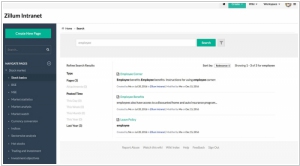Confluence vs Zoho Wiki
March 15, 2025 | Author: Adam Levine
25★
Confluence provides one place for technical teams to collaborate—create, share, and discuss your ideas, files, minutes, specs, mockups, diagrams, and projects. A rich editor, deep Office and JIRA integration, and powerful plugins help teams collaboratively develop technical docs, intranets, and knowledge bases.
1★
Zoho Wiki, an easy to use knowledge management tool, caters to the particular needs of teams within your organization. Now you can effectively create and share knowledge.
Confluence and Zoho Wiki are, in many ways, like two slightly confused intergalactic bureaucrats who both believe they are running the same department but have vastly different ideas on how to do it. Both allow teams to scribble down important notes before they forget them, both ensure that people can see (and occasionally regret) past versions of documents and both provide enough security settings to make a paranoid android feel comfortable. They also let you slap on integrations like an overenthusiastic starship engineer trying to add warp drive to a teapot. At the end of the day, both tools exist to stop people from losing track of their own thoughts, which, in itself, is a noble—if futile—pursuit.
Confluence, born in Australia in 2004, has the slightly smug air of a product that knows it’s best friends with Jira, the most obsessive taskmaster in the galaxy. It thrives among software developers, enterprise teams and other highly structured lifeforms who enjoy having a wiki that can also juggle workflows, deep integrations and enough plugins to turn a simple task into a bureaucratic epic. You can host it on your own servers if you enjoy the feeling of ultimate control or let Atlassian handle it while you sip tea and ponder life, the universe and everything.
Zoho Wiki, meanwhile, hails from India, having made its appearance in 2008 with a distinctly different philosophy—simplicity and a gentle fondness for small businesses and academic institutions that don’t need a galactic supercomputer to organize their thoughts. It’s strictly cloud-based, doesn’t fuss with self-hosting and prefers the cozy embrace of the Zoho ecosystem rather than sprawling marketplaces of third-party plugins. If Confluence is a massive space station with interconnected control panels and blinking lights, Zoho Wiki is a well-organized bookshop with a friendly AI assistant that occasionally suggests you try Zoho CRM while you’re at it.
See also: Top 10 Wiki software
Confluence, born in Australia in 2004, has the slightly smug air of a product that knows it’s best friends with Jira, the most obsessive taskmaster in the galaxy. It thrives among software developers, enterprise teams and other highly structured lifeforms who enjoy having a wiki that can also juggle workflows, deep integrations and enough plugins to turn a simple task into a bureaucratic epic. You can host it on your own servers if you enjoy the feeling of ultimate control or let Atlassian handle it while you sip tea and ponder life, the universe and everything.
Zoho Wiki, meanwhile, hails from India, having made its appearance in 2008 with a distinctly different philosophy—simplicity and a gentle fondness for small businesses and academic institutions that don’t need a galactic supercomputer to organize their thoughts. It’s strictly cloud-based, doesn’t fuss with self-hosting and prefers the cozy embrace of the Zoho ecosystem rather than sprawling marketplaces of third-party plugins. If Confluence is a massive space station with interconnected control panels and blinking lights, Zoho Wiki is a well-organized bookshop with a friendly AI assistant that occasionally suggests you try Zoho CRM while you’re at it.
See also: Top 10 Wiki software




